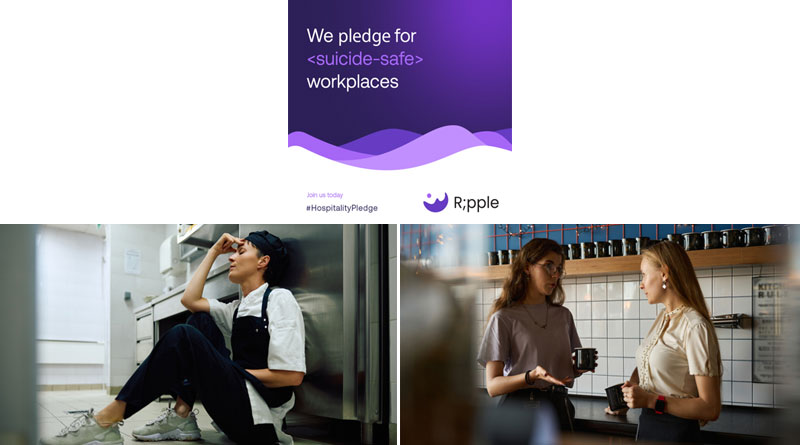The Dark Reality Behind The UK’s ‘Happy Hour’: One In Two Hospitality Workers Have Searched Harmful Content Whilst At Work

Ahead of World Suicide Prevention Day on 10th September, R;pple, the suicide prevention charity, reports the unknown mental health crisis affecting the hospitality industry, after speaking to chefs, bartenders, front of house and waiting staff across the UK.
Despite the passion and energy that creates exciting experiences for customers, statistics reveal that this joyful customer service belies a sector of workers at high risk of poor mental health and suicide. An eye-watering three in five (59%) of hospitality workers are experiencing mental health conditions whilst at work, and one in two have thought of suicide, self-harm or other harmful, negative thoughts. This means most of us would have at one point come face-to-face with someone having a mental health crisis whilst they ‘happily’ serve customers.
Shockingly, over half (55%) of respondents who are or have experienced mental health conditions whilst working in the sector, have also searched for harmful content online whilst in their workplace, with almost a fifth (19%) having done so multiple times.
Almost two-thirds (61%) have been concerned about a colleague’s mental-wellbeing and three quarters (75%) of hospitality workers were concerned that their colleagues were accessing harmful content while in the workplace, which is sadly, only one click away. Harmful self-injury content is prevalent across the main five search engines; one in every five (22%) search results linked to, in a single click, content which celebrates, glorifies, or offers instruction about non-suicidal self-injury, suicide or eating disorders**.
The research also unveiled that out of those who rated their mental wellbeing as poor, two thirds (66%) of hospitality workers suggested that their work/job is the main catalyst; long working hours, zero-hour contracts, high stress environments and a work hard/play hard mentality are among the key issues contributing to the problem in the industry.
But this doesn’t have to be the norm, and organisations are already making waves to improve. R;pple is campaigning for change in partnership with industry friends the Revolution Bars Group – the popular chain that has rolled out the R;pple tool on its Wi-Fi networks for all its employees nationwide – and The Burnt Chef Project – a community for mental health support and education for the hospitality industry.
Together this World Suicide Prevention Day, R;pple is calling on employers to sign up to its five commitments, such as mandatory suicide prevention training, for employers to pledge to, to make positive changes and protect their workforce.
It’s key to highlight that there are also positive outtakes from the research. Kris Hall, CEO & Founder of The Burnt Chef Projectsaid:
“It’s encouraging to see from this report that nearly 75% of individuals in the hospitality sector were able to seek support during a shift when they found themselves in a difficult mental space. This highlights the growing awareness of mental health issues within the industry and suggests that confidence is gradually increasing when it comes to addressing underlying mental health concerns. With 60% of hospitality workers feeling that their personal lives positively impact their mental well-being, reinforcing the critical role of work-life balance is key. Ensuring that team members have sufficient time outside of the workplace is crucial for overall better mental health.”
Alongside Revolution Bars and The Burnt Chef Project, R;pple will also be hosting a panel talk and Q&A to ignite conversation and change and help reduce the stigma around suicide. Taking place on 30th September in central London, key speakers will include Alice Hendy MBE (R;pple), Kris Hall (The Burnt Chef Project), Danielle James (Revolution Bars Group PLC) and others to be announced that faced their own mental health crisis in the industry with powerful stories to tell.
Alice Hendy MBE, founder of R;pple, said:
“Most of us regularly interact with people in hospitality without any knowledge of the mental health crisis they might be facing, so these statistics are a stark reminder of the need for change. The positive news is mental health stigma is lifting, but we still found only around half of those concerned about a colleague encouraged them to talk. We need to make sure that everyone working in a highly affected sector like hospitality is protected by their employers in the workplace online, in the same way their health and safety is protected physically.”
R;pple is available to download as a computer browser extension and onto Wi-Fi networks. Once installed, any users’ harmful online search is intercepted first with guided breathing exercises followed by a selection of mental health services that they can access and use immediately and in the longer term, accompanied by messages of hope to help keep the person safe.
Danielle James, Head of Pay & Reward at Revolution Bars Group PLC, said:
‘It is our duty to the service industry to provide the means for our teams to better service their own wellbeing. We are extremely grateful to R;pple for working with us so closely to ensure we are leading the implementation of the tool within the sector. We support R;pple’s journey to introduce their safeguarding tool far and wide, but specifically within guest-facing sectors such as hospitality and retail where smiles seemingly mask these distressing statistics. This is not about getting everything right all of the time. Simply, it’s about starting somewhere.”
For more information on R;pple’s World Suicide Prevention Day Campaign, and to discover and sign up to the five commitments for your business, head to https://www.ripplesuicideprevention.com/get-involved/hospitality-pledge
